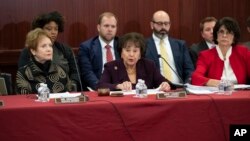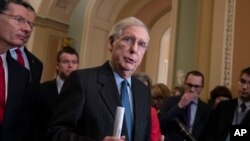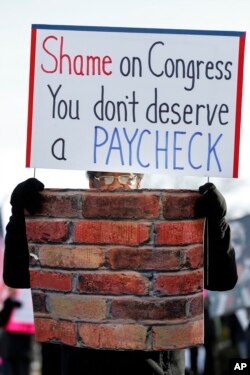High-stakes political negotiations began Wednesday in Washington that could determine whether the U.S. government will be plunged into another partial shutdown come the middle of February.
A bipartisan group of Senate and House members will try to craft a compromise on funding border security, the issue at the heart of the 35 day government shutdown that ended last week — the longest in U.S. history.
Negotiators have until Feb. 15 to find a solution or risk the prospect of the government being shut down again.
The government reopened after President Donald Trump and opposition Democrats agreed to work toward a compromise on border security. But as the congressional conference committee began its work Wednesday, Trump sent out a tweet warning the group they were “wasting their time” unless there was discussion of a “wall or physical barrier.”
Another shutdown?
In announcing the end to the shutdown Friday, Trump warned of more trouble ahead unless he got funding for a border wall.
“We really have no choice but to build a powerful wall or steel barrier,” Trump told reporters at the White House. “The government will either shut down on February 15, again, or I will use the powers afforded to me under the laws and the Constitution of the United States to address this emergency.”
But is another government shutdown really politically viable? It seems a lot of Republicans don’t think so, including Senate Majority leader Mitch McConnell.
“I don’t like shutdowns. I don’t think they work for anybody, and I think they ought to be avoided,” he said.
Political fallout
Opinion polls found that the public largely blamed Trump and Republicans for the shutdown, and a new survey from Morning Consult and POLITICO found that they would be held responsible for a second shutdown as well.
According to the poll, 54 percent of voters would blame Trump and congressional Republicans for another shutdown, compared to 33 percent who would point the finger at Democrats.
“I hope this serves as a lesson to President Trump and all of my Republican colleagues — no more shutdowns,” Senate Democratic leader Chuck Schumer said to a gaggle of reporters Tuesday. “President Trump touched a hot, hot stove, and hopefully he won’t do it again.”
Several recent public opinion polls also showed the president’s approval rating dipping below 40 percent in the wake of the shutdown. One survey by the Associated Press found Trump’s approval number had fallen to 34 percent, a big drop from the 42 percent approval it was just the month before.
Turning point?
Several analysts have noted the poll numbers and the fact that Republicans appear to be backing away from the idea of yet another shutdown.
“It looks like we have hit a turning point of sorts. The president severely misjudged the effects of the shutdown on ordinary people,” said Elaine Kamarck, a senior fellow in governance studies at the Brookings Institution in Washington. “Nobody in that White House really and truly understood how important federal government functioning was to the whole American economy.”
Some Trump supporters hope the president learned a lesson from the shutdown impasse and they expect him to rebound, including former New Jersey Governor Chris Christie.
“I mean, he is fearless in a way that I have seen few people in politics be fearless, and so those are all good points,” Christie said in an interview with ABC’s This Week. “But when you act on impulse and you do not have a plan sometimes, as I think what happened with the shutdown, it does not end well.”
Given the unpopularity of the shutdown reflected in the polls, many Trump supporters now expect the president to declare a border emergency to build the wall if Congress fails to find a compromise by next month. That could lead to court challenges that might tie up the funding issue indefinitely.
“To build the wall was core to his worries about immigration. It was a slogan on the campaign trail,” said John Fortier of the Bipartisan Policy Center in Washington. “This is something that he does not want to be seen as completely capitulating on and that makes it very tough to compromise.”
Positioning for 2020
On the other hand, Kamarck predicted that Trump could weaken his own re-election hopes by continuing his singular focus on pleasing his core supporters.
“This president only speaks to his base. He has not tried in his two years in office to expand his base. That is a disaster for a president because inevitably some of your base is going to peel away,” she said.
The president’s next best opportunity to make his case on a border wall is Tuesday’s State of the Union address before a joint session of Congress and a national television audience.
Republicans and Democrats alike will be listening to see if the president once again invokes the prospect of a government shutdown if he is denied money for his border wall, or whether he indicates that declaring a national emergency would be his preferred course of action.









